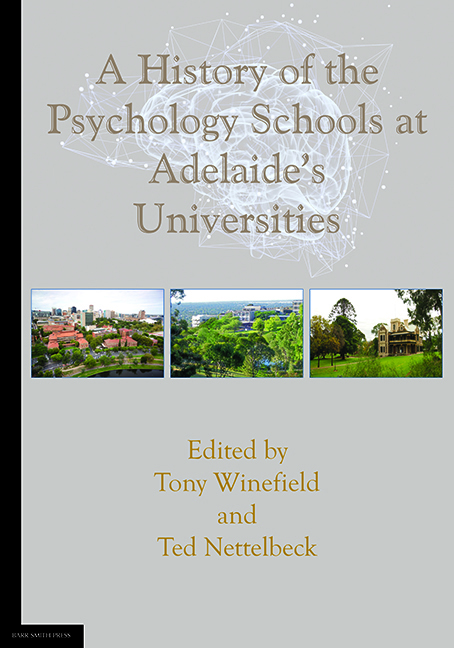Book contents
- Frontmatter
- Contents
- List of contributors
- Preface
- 1 Introduction
- 2 The origins and early history of the University of Adelaide's School of Psychology
- 3 The later years
- 4 Teaching applied psychology at the University of Adelaide: A personal view
- 5 Flinders University: Psychology in the twentieth century
- 6 Recent history of Flinders School of Psychology
- 7 The history of Psychology at the University of South Australia: From little things big things grow
- 8 The history of Psychology at the University of South Australia: Recent history
1 - Introduction
Published online by Cambridge University Press: 25 July 2017
- Frontmatter
- Contents
- List of contributors
- Preface
- 1 Introduction
- 2 The origins and early history of the University of Adelaide's School of Psychology
- 3 The later years
- 4 Teaching applied psychology at the University of Adelaide: A personal view
- 5 Flinders University: Psychology in the twentieth century
- 6 Recent history of Flinders School of Psychology
- 7 The history of Psychology at the University of South Australia: From little things big things grow
- 8 The history of Psychology at the University of South Australia: Recent history
Summary
This book does not aspire to cover the entire history of psychology in South Australian universities. Psychology, defined as the ‘science of the nature, functions, and phenomena, of human soul or mind’ (Concise Oxford Dictionary, 1976) or ‘the systematic study of behaviour and the mind in man and animals’ (Sutherland, 1989, p. 354), has been, and continues to be, taught in university departments and schools other than psychology, including education, philosophy, public health and psychiatry.
Psychology was taught for many years at the University of Adelaide well before the school (department) was established in 1955, thanks to the initiative of Jack Smart, professor of philosophy, who appointed two lecturers in psychology: Ullin Place and Syd Lovibond (see Chapter Three). Much earlier, in 1894, the university had appointed a Scot named William Mitchell (later Sir William) at the age of thirty-three as professor of English language and literature and mental and moral philosophy. In 1907, Mitchell published The structure and growth of the mind and later became vice-chancellor and chancellor. He died at the age of 101 (Duncan & Leonard, 1973).
Although the book by Duncan and Leonard provides much valuable information, it does not mention the formation of the Psychology Department. Another recent book on the history of the Faculty of Arts, edited by Harvey, Fornasiero, McCarthy, Macintyre, and Crossin (2014), also does not mention the School of Psychology, though it was a member of the faculty until 1997, when it transferred to the Faculty of Health Sciences. Nonetheless, the School of Psychology provided three former Deans of Arts (Malcolm Jeeves, Tony Winefield and John Brebner), whereas the School of Music was never a member of the faculty.
Another famous psychologist who graduated at the University of Adelaide was George Elton Mayo. Mayo studied philosophy and psychology under Sir William Mitchell, graduating with first-class honours in 1910 and winning the Roby Fletcher Prize in psychology, before moving to Queensland, where he completed his MA and became a lecturer, then foundation professor, at the University of Queensland, before moving to the United States. He is well known as one of the founders of industrial/ organisational psychology and the Australian Psychological Society's College of Organisational Psychologists has named a prize after him.
- Type
- Chapter
- Information
- Publisher: The University of Adelaide PressPrint publication year: 2016



